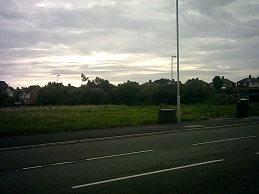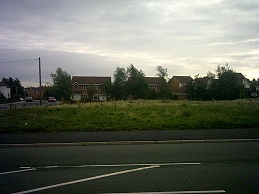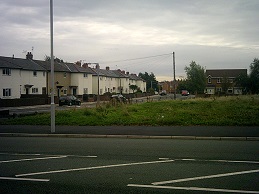Cllr Steve Foulkes “by and large the message was we got ourselves into a dark place and we needed to get out of it”
Please accept YouTube cookies to play this video. By accepting you will be accessing content from YouTube, a service provided by an external third party.
If you accept this notice, your choice will be saved and the page will refresh.
Please accept YouTube cookies to play this video. By accepting you will be accessing content from YouTube, a service provided by an external third party.
If you accept this notice, your choice will be saved and the page will refresh.
The Coordinating Committee meeting was just so councillors could discuss one agenda item, the Wirral Improvement Board review, which is currently out (at least at the time of writing) for a rather short eleven day consultation ending on Friday 15th November.
Part one of the meeting (which you can view above) contained a rather long Powerpoint presentation from the Head of Policy and Performance/Director of Public Health (Fiona Johnstone). As usual though the more interesting comments were made by councillors and the first of those to comment was former Leader of the Council Cllr Steve Foulkes (which starts at 17:33 in the first video clip above).
He said, “Chair, I mean clearly the Council had found itself in difficult times with a number of highly critical reports. I have no intention of going back to the origin of those reports and the issues around them but needless to say it did certainly undermine confidence of the public in the Council to the degree where it felt necessary that we wanted to move and incorporate outside help and I got lots of things wrong in my position as Leader but one of the things we did get right was actually open ourselves up and suggest the sector led approach improving on what we’ve established. So I think we did the right thing at a very difficult time we felt.
We, under any circumstances a report of this nature and its independence so the people who were writing this report aren’t our people, there’s three political mentors who were signed up to the outcome of this report. If we took seriously and we did, the fact that say the Klonowski report, obviously independent was a significant issue then where reports praise us and they are also written independently then rightly we should give the praise equal value against the criticism because the fact is that’s an independent report. This isn’t us saying this about ourselves, these are people who work for us and see the change and you know from Chief Exec down to a number of officers it’s fairly unrecognisable the structure of the Authority from whence we started. So we have been able to make those changes.
I think we have made improvements to a point where we could run, be on our own and they’re saying that, so that’s to be welcomed. The one issue that is in the report that I think you I know slightly mentioned about audit and the audit committee. Certainly I know through working with Jim as Chair and the other Members who are represented on audit, we did make vast improvements to the way the audit committee functioned and its job. However this issue of independence I think alongside the world we’ve got where there are a number of independent views because we are cynical of politicians in general in the Wirral and so I think that the audit committee with an independent majority certainly should have more credibility on an ongoing basis Chair I think that’s true.
The thing is we’re by no means where we would like to be. We’ve also had an ambition to be you know a journey to excellence or whatever type of authority you want to be or an excellent Council and underneath we’re not. I think you said Fiona we’re not there. We don’t expect to be perfect and any large organisation will always make errors and we shouldn’t be castigated for a single error and that’s the way it always is because you know errors will happen in whatever work, walk of life you’re in. Mistakes do happen.
It’s how you react to those mistakes, it’s what you do about them and what the overall point of this is. At the same time making this journey against the most difficult financial background that I think anybody’s ever seen in their lifetime. It’s never been easy on local authorities, but the level of savings we’re being asked to make are of such a magnitude, it can’t be easy to this improvement, trying to do an improvement job at the same time as these other things.
So I welcome in general, I welcome the report. It’s a job half done, but half done we shouldn’t be complacent and we should try to move on. You know we’ve all had to do a little bit of sort of inward reflection. Are we doing our best as individuals, each one of us around the table and the lead officers as well and to agree with members of the public engaging in the debate. We’re doing our bit, we changed something that we do to make this Council better.
Certainly I know numbers of Members have engaged in training, taking those roles on, we’re certainly working hard on scrutiny as Alan over there will testify. I think we do need to take on board a review of scrutiny committees in the new year.
Comments that are in the report and those particularly those around health and social care scrutiny committee that’s had you know quite a number of comments made. We need to do that whether that means we supplement it by members of other committees, we need to be open-minded, imaginative in the way we approach it. So if someone throws a problem at us then we need to work together to deal with that.
There have been various levels of engagement with various Members but I think you know credit to the three party leaders who have sat in a room together on numerous occasions throughout this journey and tried and have generally seem to have been able to work together, it’s a comment made within the report.
So I think all in all if we accept the critical reports of an independent nature and basically say we take them verbatim because to do otherwise would be stupid and people would say you’re trying to hide or you’re trying to alter it. I don’t agree with every single word in the summary but by and large the message was we got ourselves into a dark place and we needed to get out of it.
I think likewise we should recognise that this is you know a journey of improvement that’s been undertaken, it’s been recognised by others outside the Council. We should be thankful for it and thank those who are part of it. As the presentation has gone on I’ve put a number of words together. I’ll see if it finds favour, it’s not particularly controversial but I think we need to accept where we are, never mind the fact that we can always improve and we shouldn’t forget those mistakes from the past and rectify those mistakes from the past as soon as we can, we just need to recognise that.
It’s been a difficult period and this is a good report, a good independent report. We should take it for what it is and use it as an encouragement, a bread and butter role in the process for Members, members of staff, Chief Officers, members of you know for every single employee we should say thanks for being involved in this. We are moving in the right direction. That’s just my take on it, you may disagree.”
If you click on any of these buttons below, you’ll be doing me a favour by sharing this article with other people. Thanks:


